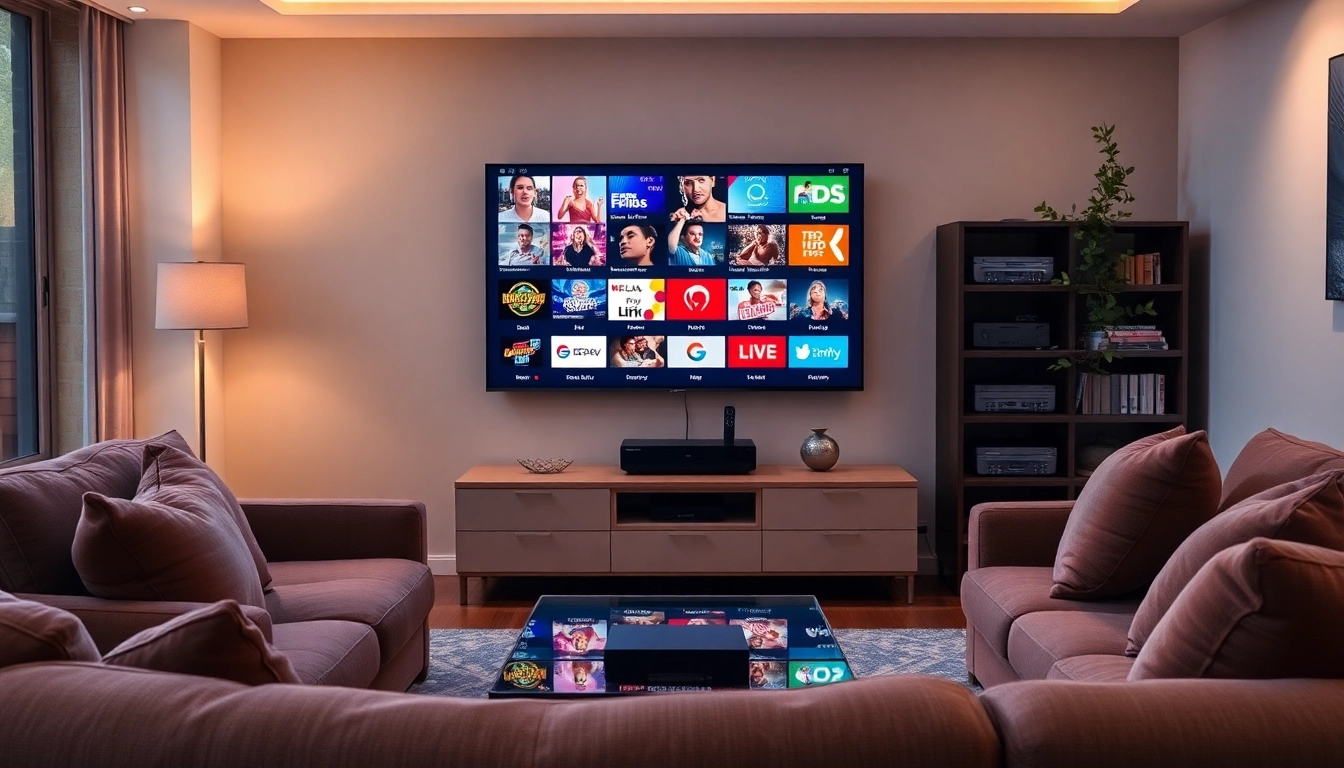
Understanding IPTV: What Is IPTV Subscription USA?
Definition and Basics of IPTV
IPTV, or Internet Protocol Television, refers to a method of delivering television programming and video content via the Internet rather than through traditional terrestrial, satellite, or cable formats. In an increasingly digital world, IPTV is revolutionizing how we consume media, providing viewers with the flexibility to watch their favorite shows at their convenience on a variety of devices. IPTV works by encoding and transmitting video streams in the form of data packets, which can be sent and received over the Internet. This innovative approach allows for a more streamlined and efficient viewing experience, especially when compared to conventional cable services that require bulky hardware and infrastructure.
How IPTV Works for Streaming
The IPTV service typically works through a three-tier architecture: content providers, service providers, and end-users. Content providers are studios or broadcasters that produce shows and movies, while service providers distribute this content through various platforms. End-users, or consumers, subscribe to these services to access the content through their Internet connection.
IPTV operates primarily through three types of services:
- Live TV: This allows users to watch live broadcasts in real-time, similar to traditional television.
- Video on Demand (VOD): Viewers can select and watch content whenever they choose, without being restricted by broadcast schedules.
- Time-shifted TV: This feature enables users to pause, rewind, or record live television programs for later viewing.
This flexibility in viewing content enhances user satisfaction and caters to a diverse audience with varying preferences.
Benefits of IPTV Subscriptions in the USA
As the demand for accessible and customizable entertainment options grows, IPTV subscriptions in the USA provide several advantages over traditional cable services. Here are some notable benefits:
- Cost-Effectiveness: IPTV subscriptions generally offer competitive pricing compared to cable packages, often including a wider variety of channels at lower monthly rates. Users can find plans that start as low as $6.99 per month.
- Extensive Channel Selection: With access to thousands of channels, including international content, and specific interest groups like sports, movies, and educational programming, users can tailor their viewing experience.
- On-Demand Access: Subscribers can watch their favorite shows and movies without worrying about scheduling conflicts, thanks to the extensive library of on-demand content that most IPTV providers offer.
- Multiple Screen Access: IPTV services can be used across different devices, including smartphones, tablets, smart TVs, and computers, appealing to users who wish to watch content on the go.
- 1080p and 4K Streaming: Many IPTV services offer high-definition content, which enhances the viewing experience with stunning visuals and clear audio.
With all these benefits, it’s clear why so many users are opting for IPTV Subscription USA over traditional television services.
Key Features of IPTV Subscription USA
Wide Selection of Channels
One of the most enticing aspects of IPTV subscriptions is the extensive selection of channels offered. Unlike traditional cable packages that may be limited by physical bandwidth, IPTV services can provide access to an almost limitless number of channels across genres like sports, news, entertainment, and international programming. For instance, many providers offer specialized content for niche audiences, arrangements for packages that focus on specific genres such as horror, children’s programming, or documentaries.
On-Demand Content Availability
With on-demand features, viewers enjoy the freedom to watch what they want, when they want. This capability is fundamental to modern entertainment consumption habits, making it highly appealing for busy lifestyles. Most IPTV services provide a diverse library of movies, series, and documentaries that can be accessed any time, housing thousands of options for binge-watching.
Compatibility with Multiple Devices
Another significant advantage is the compatibility of IPTV services with multiple devices. This versatility allows subscribers to enjoy their content on various platforms, whether they are at home or on the go. IPTV can be accessed through smart TVs, streaming devices like Amazon Fire Stick and Roku, smartphones, tablets, and laptops. This cross-device functionality significantly enhances user convenience and ensures seamless viewing experiences.
Pricing Models for IPTV Subscriptions in the USA
Monthly vs. Yearly Subscription Plans
Pricing structures for IPTV subscriptions generally fall into two main categories: monthly and yearly subscription plans. Monthly plans are often favored by new users who want to test a service before committing long-term. These plans typically range in price from $10 to $50, depending on the number of channels and available features.
Conversely, yearly plans generally provide a significant discount compared to the monthly rate. Subscribing for a year can often cost less than $5 per month, encouraging users to commit for longer periods. For instance, a popular tier might cost $59 annually for comprehensive access to channels and on-demand content.
Comparing Costs with Traditional Cable Services
When comparing IPTV subscriptions to traditional cable services, consumers will often find that IPTV tends to be more affordable and offers greater value for the investment. For instance, a standard cable package can easily cost $100 or more per month, and this doesn’t usually include premium channels or on-demand content. In contrast, IPTV offers bundled packages that deliver more extensive options at lower prices, fostering a more attractive value proposition for viewers.
Understanding Value for Money
To get the most value from an IPTV subscription, it’s essential to assess not only the price but also the features included. Factors such as the breadth of channels, quality of streaming, on-demand content availability, device compatibility, and customer support services are critical components of overall value. In this regard, customers should take the time to evaluate different service providers and their offerings to ensure they choose the option that provides the best combination of features and price to fit their viewing habits.
Legal Considerations Around IPTV Subscription USA
Is IPTV Legal in the United States?
The legality of IPTV services can be a complex topic. Generally speaking, IPTV services that distribute content legally obtained from legitimate sources are legally permissible in the United States. This means that users can enjoy IPTV subscriptions that have agreements with content distributors to provide shows and channels legally.
On the other hand, illegally operated services that offer “pirated” streams are not legal and can expose users to penalties, including fines and humiliation. Users are encouraged to research the service they choose to ensure that it operates within the legal framework to enjoy their content worry-free.
Choosing Legal IPTV Providers
When selecting an IPTV service provider, it’s paramount to consider services that emphasize transparency in licensing agreements. Services that highlight their partnerships with networks and broadcast companies are typically more trustworthy. Additionally, legitimate IPTV services often offer trials or money-back guarantees, which allow users to test the service without the risk of losing money. Examples of well-known legal IPTV providers include Hulu + Live TV, Sling TV, and YouTube TV, all of which provide access to a broad range of channels and content.
Potential Risks of Using Unregulated IPTV Services
Subscribing to unregulated IPTV services may attract various risks. Aside from the potential for legal repercussions, these services often compromise user security and can expose subscribers to malicious attacks or data breaches. Poor streaming quality, lack of customer support, and susceptibility to sudden service shutdowns are other unfortunate realities of using unauthorized IPTV options.
To avoid such pitfalls, users should prioritize licensed IPTV services that adhere to legal standards and offer reliable, quality content.
Troubleshooting Common IPTV Issues
Connectivity Problems and Solutions
While IPTV services generally provide excellent streaming experiences, users may occasionally encounter connectivity issues. Problems such as buffering, freezing, or intermittent connection can typically be attributed to Internet speed, router settings, or device compatibility. Here are a few troubleshooting tips:
- Check Internet Speed: Ensure that the internet connection speed meets the IPTV service provider’s recommended requirements (usually at least 10 Mbps for HD streaming).
- Restart Your Devices: Reboot your modem, router, and streaming devices to refresh connections and improve performance.
- Wired Connection: If using Wi-Fi, try connecting via an Ethernet cable for a more stable connection.
Improving Streaming Quality
For users experiencing poor streaming quality, several factors may contribute to this issue:
- Change Streaming Quality Settings: Many IPTV services allow users to adjust video quality settings based on their Internet speed.
- Close Background Applications: Ensure that no other apps or programs are consuming bandwidth, which can slow performance significantly.
- Use a VPN: A VPN can help improve streaming quality and prevent throttling from ISPs by rerouting your connection.
Customer Support and Resources
For troubleshooting more complex issues, robust customer support is an invaluable resource. Subscribers should look for IPTV providers offering comprehensive customer service that includes live chat, email support, and FAQs on their websites. This support can assist in addressing technical difficulties and service inquiries promptly, contributing to overall customer satisfaction.







